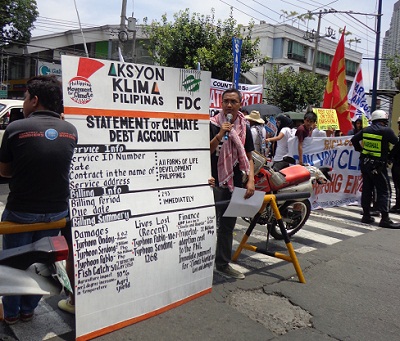Hundreds of protesters marched outside a United Nations long-term climate finance meeting in Makati to put pressure on governments for more climate action and funding.
Carrying placards and streamers such as “climate justice now” and “pay up your climate debt”, the rally was joined by more than 200 people led by civil society groups Aksyon Klima Pilipinas (AKP), the Philippine Movement for Climate Justice (PMCJ) and the Freedom from Debt Coalition (FDC) during the two-days meeting of the Long-Term Finance program under the UN Framework Convention on Climate Change (UNFCCC).
 In a joint statement, the groups called on the delegates of richer or developed countries, which emitted the most greenhouse gas emissions throughout history, to “pay up their climate bill” by funding the adaptation and mitigation efforts of poorer or developed countries and by reducing their own greenhouse gas emissions.
In a joint statement, the groups called on the delegates of richer or developed countries, which emitted the most greenhouse gas emissions throughout history, to “pay up their climate bill” by funding the adaptation and mitigation efforts of poorer or developed countries and by reducing their own greenhouse gas emissions.
In their mobilization, the activists presented a “billing statement” for developed countries which listed climate change impacts, including casualties and damages from typhoons, decreasing agricultural yield and fish kills.
Their statement was handed to Naderev Saño of the Philippines and Mark Storey of Sweden, co-chairs of the UNFCCC Long-Term Finance program.
The Long-term Finance program aims to help raise at least USD 100 billion every year by 2020 for the adaptation and mitigation activities of poorer countries like the Philippines, which also happens to be among the most vulnerable to the impacts of climate change.
“The Philippines and other poorer countries are doing what they can to raise their own funds for adaptation and mitigation, but those who have the most responsibility should do their long-overdue share,” said Voltaire Alferez, AKP national coordinator.
The type of funds raised for climate finance also matters, said Gerry Arances, PMCJ national coordinator.
“There are existing funds but most are coursed through private sector facilities, repackaging of development funds, and in the form of loans instead of grants. What must be mobilized are public funds to ensure that developed countries are paying their climate debt and to eliminate climate profiteers, who are most likely also the culprits in the private sector,” Arances explained.
In addition, FDC “deplores the fact that the same powerful global interests and entities responsible for the economic domination and underdevelopment of the South, including the Philippines are the same forces mainly responsible for the climate crisis,” according to its president Ricardo Reyes.
The groups also called on the governments to create a low carbon society; scale-up new and additional funds; to hasten the process of accessing climate finance; and to improve climate fiancé reporting to the public.
photo credit: Mayette Rodriguez/CERD and Philippine Movement for Climate Justice (PMCJ)
Latest posts by EnviroNewsph (see all)
- Global fund aimed at protecting nature and accelerate investment in conservation, launched in Canada - August 25, 2023
- Why ‘loss and damage’ is the most bitterly fought-over issue at COP27 climate talks? - November 18, 2022
- U.S. hands over P2.3M in equipment and wildALERT system to PH to protect wildlife - December 16, 2020
